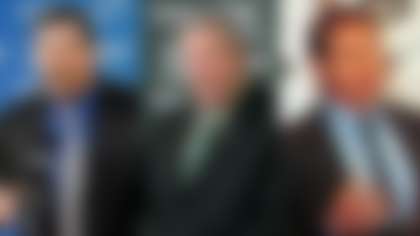Chip Kelly's catching flak from passionate Eagles fans, but patience might be in order for a coach who compares to another outsider who once won over Philadelphia
By Conor Orr | Published Sept. 30, 2015
Illustration by Gautam Dutta
PHILADELPHIA -- Eagles head coach Chip Kelly and former Philadelphia Mayor Ed Rendell, the city's favorite politician and eventually Pennsylvania's favorite governor, met for the first time on a Sunday in early May.
The local icon had been invited to the NovaCare Complex to watch a fan announce the team's seventh-round draft pick. When Kelly emerged from his draft bunker to address the media, the two crossed paths. Kelly turned to Rendell and invited him to sit in the front row.
"I'm about to have a press conference, why don't you come on down?"
The moment wasn't awkward. Rendell -- who, in his retirement from politics, works on the Eagles' postgame show, writes a column for the Philadelphia Daily News and observes the local team with the religiousness of his former constituents -- feels like he's known Kelly for years, at least through the prism of a public figure and outsider trying to give the city something crucial. For Rendell, that was a sense of freedom from the crippling financial issues that nearly bled the city dry in the mid-1990s. For Kelly, that is a Super Bowl.
Rendell rescued the city from the brink of urban decay. He built buildings, mended fences and avoided a massive worker shutdown. His tenure, chronicled in Buzz Bissinger's book, "A Prayer For The City," is viewed as a modern blueprint for major American cities on life support.
The Eagles, despite making 24 playoff appearances, capturing 13 division titles, winning three pre-Super Bowl era championships and taking the NFC title twice, have never won a Super Bowl, and they've started the 2015 season 1-2. The city has only raised one banner in the past 32 years: the one belonging to the 2008 Philadelphia Phillies.
When asked about the similarities, Rendell did not scoff. He understands the delicate relationship between Philadelphia sports and the health of the community. He knows what a Super Bowl win would mean.
And he understands how difficult it is to be in Kelly's position as a relative outsider. As revolutionary as Rendell's ideas were, he was still a know-nothing Brooklynite who had lost two previous elections -- one in 1986 for governor, one in 1987 for mayor -- and had his house and office mobbed by picketers throughout the five-year process of balancing the city. Kelly, who often evokes the inaccessibility and pretentiousness of a college professor, is nothing like missile-mouthed former Eagles coach Buddy Ryan or the ultimate yokel, former Phillies manager Charlie Manuel, two out-of-town personalities who were able to become a part of the city's fabric over time.
Thinking about the dynamic made Rendell remember something his wife, Marjorie, always said: "This is an amazing town, because after a while, the town tends to turn on everybody."
After an offseason of upheaval, Kelly's team is in last place in the NFC East. His new franchise quarterback has more interceptions (four) than touchdowns (three), and his high-priced new running back can't find any room to run -- 11 yards on 21 carries -- when he's healthy enough to play.
Will the town turn on Kelly, too?
When Ed Rendell took office in the winter of 1992, he confronted a financial situation that had left a gap in the budget totaling $1.246 billion -- as Bissinger wrote, "a budget deficit bigger than the entire budget of Boston or Houston or Baltimore."
In the 30 years that preceded his first term as mayor, Philadelphia had lost roughly 400,000 residents and dropped two places on America's list of most populated cities (from third to fifth). One-fifth of the city was below the poverty line in terms of median household income.
In order to achieve financial solvency, Rendell had to confront municipal unions entrenched in power. According to Bissinger, Rendell and his budget committee targeted people who, they felt, earned outlandish salaries, benefits, paid leave and other perks, and who were gutting any chance the city had of restoring budgetary harmony. This would not be simple, however, given the strong role unions had played in the city's history.
Rendell jokingly called his plan, which required his cabinet and chief negotiators to alter worker rights and benefits to a level that would help balance the budget, "City of Philadelphia: Five-Year Financial Plan -- No Way Out."
"You never make great change without significant trepidation," Rendell said in a recent phone conversation. "If you're striving to make great change, it is almost inherently an all-or-nothing proposition. I knew it had to work, but I wasn't sure Philadelphia wouldn't just become Detroit."
Rendell's departure from victory streamers and confetti was rapid. He soon felt the accelerated ups and downs that have become synonymous with his town.
Very early on in his first tenure, in that same winter of 1992, Rendell attempted to meet with the unions and offer an olive branch shortly before he was going to announce his plan to a citywide audience on TV. He would give them early copies of the plan as well as personalized letters to every worker impacted by the changes in budget. He wanted to hear their suggestions. He wanted to soften the blow.
People around here always keep their eyes to the sky for the falling anvil, no matter how well things are going for the Eagles. Mike Sielski
But with reporters crowding outside the expected meeting place, the union staged an epic boycott, leaving the mayor in the room by himself. He left for the TV studio with the knowledge that the city's most powerful people hated him.
City Hall was bombarded with protestors. Rendell was picketed nearly everywhere he went, and it wasn't just union workers, either. It was low-income housing tenants and workers from the city's department of health.
"We loved Andy Reid when he came in, but after a while, the town turned on Andy Reid," Rendell says now. "Dick Vermeil got out before they had the chance, but even political leaders, those who have an initial popularity at the beginning simply don't at the end."
It's early on a preseason Monday morning inside the studios of WIP-FM 94.1, the nerve center of the city's bustling talk-radio scene. Host Angelo Cataldi's voice, a perfect mix of Philadelphian, Boston haw and Long Island twang, smacks the gray-and-white walls during a series of rants that almost perfectly embody the city's relationship with the Eagles' head coach.
He answers calls by saying he feels pretty good about "his" team. He predicts a season of double-digit wins.
Then, moments later, he chastises Kelly for a flippant response to reporters about why DeMarco Murray, Kelly's star running back, didn't play in the preseason opener. He makes bawk-bawk chicken sounds. He says the pope, who was then preparing for a visit to the city, would get any credit for a championship this season.
"For a team that won 20 games in two years, there's so many questions," said a producer who goes by the nickname Turtle. He's been at the station for nearly a decade.
You never make great change without significant trepidation. If you're striving to make great change, it is almost inherently an all-or-nothing proposition. Gov. Ed Rendell
Before Turtle came in for work that morning, there was a digital board lit from top to bottom displaying the dozens of callers on hold, the topic they'd like to discuss and the amount of time they've been waiting. Pete from Pennsauken is up next. Brian -- in the car -- has been waiting for 45 minutes. On Sundays after football games, callers can experience hold times in excess of three hours.
The board of potential topics -- Eagles, Eagles, Eagles, Eagles, Tebow, Tebow, Eagles, Eagles, Eagles -- reveals the obvious: It is football season. The team's odds of winning the Super Bowl have dipped below 10:1. Nothing else matters.
Though talk radio is merely a subset of Philadelphia's sports culture, it provides a certain fuel that makes the city one of the most interesting -- and difficult -- places in which to coach. Consider that Cataldi famously led a convoy called "The Dirty 30" to the 1999 NFL Draft. It was an organization of fans intent on mercilessly booing any player the Eagles drafted, should it not be Texas running back Ricky Williams. The team, of course, ended up selecting quarterback Donovan McNabb. Cataldi would later admit that he regretted that decision.
"I think the talk-radio culture does drive discussion in Philly to some extent," said Mike Sielski, a sports columnist at the Philadelphia Inquirer. "This is a different market from New York. There, the papers and websites still are the primary movers of the needle, and most people, I think, recognize that as such. Here, the papers and websites have the same function; none of the talk-radio hosts here would have much of a show without us. But there is a greater sense among the public that being on the radio is somehow 'bigger' than writing. I get lots of 'I heard you on WIP or The Fanatic' feedback whenever I do an appearance.
"That said, more than anything talk-radio is the best representation and outlet for the angst that seems to be inherent among Philly fans. People around here always keep their eyes to the sky for the falling anvil, no matter how well things are going for the Eagles, and talk-radio gives them a place to vent that apprehension and outrage."
A month later, on the Monday following Philadelphia's second regular-season loss, that anvil dropped, shattering the delicate house of cards Eagles fans had used to contain their Super Bowl dreams. WIP afternoon hosts Michael Barkann and Ike Reese, a former Eagles player, are awarding callers for the best Eagles rants they can spit out. If the callers had any decision power, McNabb would still be quarterback and Kelly would be on a bus back to New Hampshire. Seventy-two percent of them vote that the team will not make the playoffs.
A sampling of callers heard on the radio that day:
"All yesterday did was make me long for the days of Andy Reid and Donovan. It was abysmal. ... If this is the best that Chip Kelly can do on his own, it's time for him to get out. Get out."
"It's like getting dressed up, going over to the house to pick up a woman for a date and she's not even home. We've lost the pursuit of perfection. The Eagles don't strive for perfection. ... We need to get Buddy Ryan to come in and take Chip Kelly's ego down a few notches, if he'd even work with him."
"If we don't get to the playoffs, cut him."
Even Bissinger, himself a celebrity who is often quoted on and prodded for his thoughts about the Eagles, eviscerated Kelly live on 94.1 WIP after the loss to Dallas.
"This idea that he's a guru and a genius -- did he make the playoffs last year? Does he get the players up? Do you want to play in the Eagles' locker room knowing everyone is expendable? Other coaches hate him. They hate him because all they hear is how great he is. That was a disgrace. ... He's a fraud of a coach and he should go back to Oregon where he could beat up on teams 68-2 that suck."
Fans who once supported the ouster of LeSean McCoy are now clamoring about his superior yards-per-carry mark in Buffalo. They're digging up advanced statistics on offensive-line pass-blocking efficiency when it comes to jettisoned veterans Todd Herremans and Evan Mathis. Nick Foles (traded to the Rams in the offseason) wouldn't have thrown that pick against Dallas in the end zone. Jeremy Maclin (who signed with the Chiefs this offseason) and DeSean Jackson (released after the 2013 season) could take the top off a defense. Offseason addition Byron Maxwell, meanwhile, is a quitter.
Kelly's ancillary changes, like the massive investment in sports science, exercise science and nutrition, once served as an example of true genius -- and now serve as a landing pad for punchlines about miracle recovery smoothies.
How will Kelly respond if and when the city turns?
In his four years at Oregon, he never once lost consecutive games. In his first year as the Eagles' head coach, he started 1-3, including three straight losses, but that was not his team. Last season, the Eagles lost three straight at the end of the season, but with a backup quarterback under center.
This year, there are no excuses. Even injuries cannot be blamed, because Kelly knowingly loaded up on players with spotty histories, including Bradford, Murray, Ryan Mathews and Kiko Alonso. Former general manager Howie Roseman was cast into a non-personnel front office role so that Kelly could handle the roster. His scouting department was tailored in his vision from top to bottom.
At the Veteran Combine in March, the Eagles had by far the largest contingent of scouts, most of whom spent long hours under the brutal Phoenix sun interviewing players that had little to no chance of finding a place on an NFL roster.
Some rival scouts pointed to that moment as just one of the many glaring examples of Kelly's vise grip on the Eagles' future; maybe the task feels pointless, but it's the way Kelly wants it done, right down to height and weight requirements and knee circumference standards. One executive from another team described Kelly's end game as a Belichick Junior scenario, where he can eventually earn unquestioned organizational shot-calling power.
The all-in attitude of Eagles owner Jeffrey Lurie underscored a humbling press conference Kelly gave two weeks ago after his team was manhandled by the Cowboys, a performance that included a perfect 7-of-7 relief appearance by Dallas backup Brandon Weeden against Kelly's hand-picked secondary.
"I was embarrassed," Kelly said. "That's not the way we're supposed to play football and that's not what we're all about. We didn't play well yesterday. It was embarrassing how we played yesterday."
Embarrassing is not a word often associated with Kelly. His early years as an offensive coordinator at New Hampshire -- seasons where the Wildcats went 5-6, 6-5, 4-7, 3-8 and 5-7 -- are often treated like the early stages of a radical pharmaceutical study. By 2004, the miracle drug had been discovered, the Wildcats were 10-3 and Kelly was on his way to bigger and better things.
But insight into how Kelly will handle failure and mounting pressure is sparing. Those who know him offer the same banal platitudes that are associated with every coach -- a daily commitment, long hours, the grind -- mostly because Kelly prefers to operate with the secrecy, focus and intensity of a Navy SEAL.
There can be happy endings, and Rendell thinks he epitomizes this. If you ask, he'll cite an independent poll of likely voters published in the Philadelphia Inquirer in May in which 75 percent of respondents said they had a favorable opinion of him. He thinks his honesty, brutal at times, is probably the main reason.
Rendell's radical plan to balance the budget worked in that he was able to instill a sense of optimism around the city again, according to "A Prayer For The City." Business and wage taxes fell, and he was able to achieve five years of budget surplus. The population decline slowed but did not diminish altogether. Poverty rates were still high, but he left having seen a gain in jobs for the first time in Philadelphia in nearly a decade. Developers were crawling through town with plans to build hotels and restaurants.
After his eight-year stint as the city's mayor, Rendell became the chairman of the Democratic National Committee and eventually was elected as the 45th governor of Pennsylvania, a job he held until his term limit ran out in January of 2011.
At least for the moment, Rendell is no longer picketed or protested. He enjoys his unity with Philadelphia.
Coaching the Eagles is not as serious as saving the city, and maybe that is why Kelly smiles -- or smirks -- more than Rendell ever could, even with a miserable record, and even with Rendell stepping up his constructive criticism of Kelly's offensive line and usage of explosive back Kenjon Barner lately on the radio.
Winning also helps, and the Eagles avoided falling into the bottomless pit that is an 0-3 record by upsetting an undefeated Jets team on the road in Week 3. For once, Kelly's own No Way Out plan showed some promise.
But it doesn't mean Kelly wasn't curious at all about the last true radical to run this town.
After Kelly's press conference on that Sunday in May, the two met again in the hallway, and in a brief moment before Kelly breezed off, he asked Rendell a simple question.
"How'd I do?"
Follow Conor Orr on Twitter @ConorOrr.












